Dreamcast Collection
Cast-iron classics?
There are two ways to go with re-release compilations. Either you create a Director's Cut and enthusiastically tart up the games, adding never-before-seen content, next-generation sheen and, you know, a widescreen option - or you leave them pretty much exactly as they were and try to make up for it with extremely nice packaging (a la the recent Mario 25 bundle).
Neither of these approaches have been adopted when it comes to the Dreamcast Collection. The four games on the disc – Crazy Taxi, Space Channel 5 Part 2, SEGA Bass Fishing and Sonic Adventure – are unchanged since their original releases a decade or so ago, and largely unoptimised.
The box looks like should house the unwanted multi-game disc in an Xbox 360 bundle circa 2007. The menu screen, such as it is, is a static background with four low-res logos on it, accompanied by the appallingly mixed, unequalised theme music from each.
With such starkly functional packaging and a conspicuous lack of cosmetic improvements, it's down to the games themselves to make Dreamcast Collection worth the money. Sadly, of this unfortunate quartet, one of them was terrible to begin with, one hasn't aged well and one is lacking a fairly crucial peripheral.
The other one's still brilliant. But all of them suffer from severe porting issues which make you really resent playing them in this form.

There are a few consistent problems across all the ports and the sound is foremost among them. Some games are inexplicably louder than others and there are strange problems with the mixing. The sound effects and voices are bizarrely quiet in Crazy Taxi, but overly loud in Sonic Adventure. The sound quality is also universally dreadful – which, considering that Space Channel 5 Part 2 is a rhythm-action game, is more than just a superficial problem.
But the worst tragedy is Crazy Taxi's soundtrack. Due to licensing issues, The Offspring are gone. Instead you're driving around to stand-in punk that does nothing to reawaken the context-sensitive nostalgia that every re-release compilation relies upon.
Crazy Taxi's concept is evergreen and still addictive, but the game itself hasn't aged at all well. The steering is twitchy, without any sense of weight, and everything on the streets looks and acts as if it's made of plastic. It makes you wish that someone would have a go at remaking it with ludicrously amped-up modern crash physics. Perhaps Criterion would do a good job of it.
Its punishing and slightly random nature also reminds you of an essential truth about Crazy Taxi: deep down, this not a game designed to entertain you. It is a game designed to squeeze you for every last pound coin you've got in the arcade.

It's not a structure that ever translated all that well to a home console – and it relied heavily on the sense of speed, destruction and spectacle (and that music), none of which survive 11 years on. You'll come away from it feeling slightly sad.
At least you won't be infuriated to the point of self-harm, though, which is the feeling that Sonic Adventure leaves you with. It's telling that the best bits of Sonic Adventure are the moments where you have no control at all, where Sonic spins around loop-de-loops and across narrow winding platforms by himself and all you have to do hold forward and jump from time to time.
At any other point – particularly when visiting the ill-conceived "hub" sections that break up the flow between action stages by forcing you to search around for the next level – he stops and starts horrendously, building momentum at an unintuitive pace and getting stuck on invisible snags in the scenery.
It doesn't look too bad by today's standards – that colourful style has protected it from the worst effects of technology's onward march – but the whole game remains in 4:3, which immediately dates it horribly. But I've a sneaking suspicion that this game's problems run deeper than a shoddy port.

